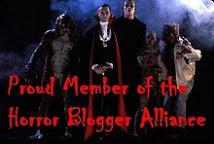The central facet of When A Stranger Calls' mystery is based in urban legend, and most people with a hankering for scary stories probably heard "the call is coming from inside the house" before they ever knew about this movie. Director Fred Walton takes that simple terror tale and expands upon it perfectly in the film's opening sequence, with a babysitter played by comedienne Carol Kane - who is perfectly unfunny in the role - being harassed by a threatening caller and taunts of "Have you checked the children?" Walton's film isn't perfect throughout this sequence - the repeating ominous musical cue gets a laugh out of me by the tenth time it is used - but the setting is dark setting of this 1970s' home and the quiet that surrounds Kane in this environment provide a lot of reasons for the viewer to feel unease.
Looking at the segment from the outside makes it easy to see how simple this manipulation of the audience is. The viewer never even meets "the children", but the implication of a threat against youngsters who have been left in the care of another is instantly effective. Parents and young women alike can relate to the worries that come along with leaving your children behind for the evening. Most of the worries that parents or babysitters have about their position are irrational or misplaced, but When A Stranger Calls uses them to its advantage in the setting sequence. This is the kind of horror scenario that may leave viewers at home shouting rationalities at the character on their TV screen, but that's often the kind of horror scenario that grips us most tightly - and When A Stranger Calls' opening act is a perfect example of that.
Which brings us to what comes after that opening sequence. For starters, it's worth noting that When A Stranger Calls has one of the most obvious three act structures of any film ever made. It starts with the setting event and the babysitter, jumps ahead seven years to a police officer turned investigator (Charles Durning) and his pursuit of the killer, and then retreats back into the life of Kane's character for the final showdown. The set up - killer kills, goes to a mental institution, escapes, terrorizes hometown - is almost a direct replica of Halloween before it, but the structure of Walton's film is more episodic than that of Carpenter's babysitter and killer opus. I get why it bugs some, and I get why Walton - who would later make another oft misunderstood sorta-slasher, April Fool's Day - ended up spending most of his career making TV movies. But that doesn't mean the approach used on this film doesn't work.
In fact, each time I view When A Stranger Calls I find myself appreciating the film's segmented narrative more thoroughly. The cat and mouse game between Durning and the killer is particularly effective on its own, with dark city streets and dirty apartment buildings serving as a perfect backdrop for the exploits of this unhinged madman. British actor Tony Beckley is fantastic as the villain, and his unpredictable actions and deep voice (which is assisted in key moments by some over the top sound effects that sound leftover from The Exorcist) really help the actor stand out in the film and make the killer more engaging to the viewer. It's a shame that this would be the final film Beckley appeared in before his death in 1980, as he seems like the kind of actor who could have given a special something to a lot of horror films in the 1980s.
The final act is more open to scrutiny than the rest of the film is, and there's a definite drop in tension from where we were in the opening. Still, it moves pretty quickly to a resolution and keeps us guessing along the way, ending with an abrupt sequence that is pretty ridiculous but fits with what the movie has offered us so far. Few people will accuse the film of being a horror classic based on the tension and the tone that it offers, but the pulpy young slasher film still makes me smile with its sleazier-than-you-expect approach that is led by Beckley's turn as the villain.
When A Stranger Calls doesn't keep up with the creepy highs of its opening act - and, in fact, Walton's made for TV sequel that premiered 14 years later has moments that sometimes overshadow this film - and few people will list the whole product as a horror classic. But closer inspection makes me think When A Stranger Calls deserves a second look, because the full film is a wonderfully melodramatic killer story with great performances and plenty of atmosphere. Fans of TV crime dramas may like it more than fans of slasher films do, but that's OK by me. It might be divisive in some ways, but at least we can all agree that we'll check the children next time we're the babysitter.
















2 comments:
I want to bugger Carol Kane (as the bird was in 1970 when the bird was 18, not as the bird is now obviously).
Just with regards to the ludicrously under-rated and superior sequel "When a Stranger Calls Back" (1993): I want to bugger Jill Schoelen (as the bird was in 1981 when the bird was 18, not as the bird is now obviously).
Post a Comment